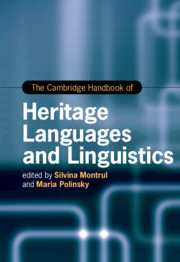Book contents
- The Cambridge Handbook of Heritage Languages and Linguistics
- Cambridge Handbooks In Language And Linguistics
- The Cambridge Handbook of Heritage Languages and Linguistics
- Copyright page
- Dedication
- Contents
- Figures and Tables
- Contributors
- Acknowledgments
- Introduction
- Part I Heritage Languages around the World
- Part II Research Approaches to Heritage Languages
- Part III Grammatical Aspects of Heritage Languages
- 23 Phonetics and Phonology of Heritage Languages
- 24 Morphology of Heritage Languages
- 25 Syntax of Heritage Languages
- 26 Semantics of Heritage Languages
- 27 Discourse and Information Structure in Heritage Languages
- 28 Pragmatics in Heritage Languages
- Part IV Heritage Language Education
- Index
- References
28 - Pragmatics in Heritage Languages
from Part III - Grammatical Aspects of Heritage Languages
Published online by Cambridge University Press: 04 November 2021
- The Cambridge Handbook of Heritage Languages and Linguistics
- Cambridge Handbooks In Language And Linguistics
- The Cambridge Handbook of Heritage Languages and Linguistics
- Copyright page
- Dedication
- Contents
- Figures and Tables
- Contributors
- Acknowledgments
- Introduction
- Part I Heritage Languages around the World
- Part II Research Approaches to Heritage Languages
- Part III Grammatical Aspects of Heritage Languages
- 23 Phonetics and Phonology of Heritage Languages
- 24 Morphology of Heritage Languages
- 25 Syntax of Heritage Languages
- 26 Semantics of Heritage Languages
- 27 Discourse and Information Structure in Heritage Languages
- 28 Pragmatics in Heritage Languages
- Part IV Heritage Language Education
- Index
- References
Summary
The investigations of heritage speakers’ pragmatic competence offer a more nuanced understanding of their language abilities because the focus of pragmatics is on language use in social situations. Research on heritage language pragmatics is developing largely along two directions: the investigation of specific speech act realizations in heritage languages and studies of the expression of politeness, including forms of address and systems of honorifics. Speech act studies indicate that heritage speakers have at least some knowledge of conventionalized forms for expressing communicative intent and required politeness, but exhibit a unique interactional style. Their pragmatic knowledge emerges as a hybrid system that shares some characteristics with the monolingual norm but is also influenced by the dominant language and by these speakers’ unequal experiences in two different speech communities – home language for mostly informal communication and the majority (societal) language for all social contexts. Due to the reduced amount of input and a lack of opportunities to employ the full repertoire of pragmatic forms, heritage speakers perform with greater ease in informal contexts. At the same time, they tend to use informal forms of address even in formal social contexts and struggle to follow complex linguistic rules for expressing obligatory normative politeness.
Keywords
- Type
- Chapter
- Information
- The Cambridge Handbook of Heritage Languages and Linguistics , pp. 728 - 758Publisher: Cambridge University PressPrint publication year: 2021
References
- 1
- Cited by



